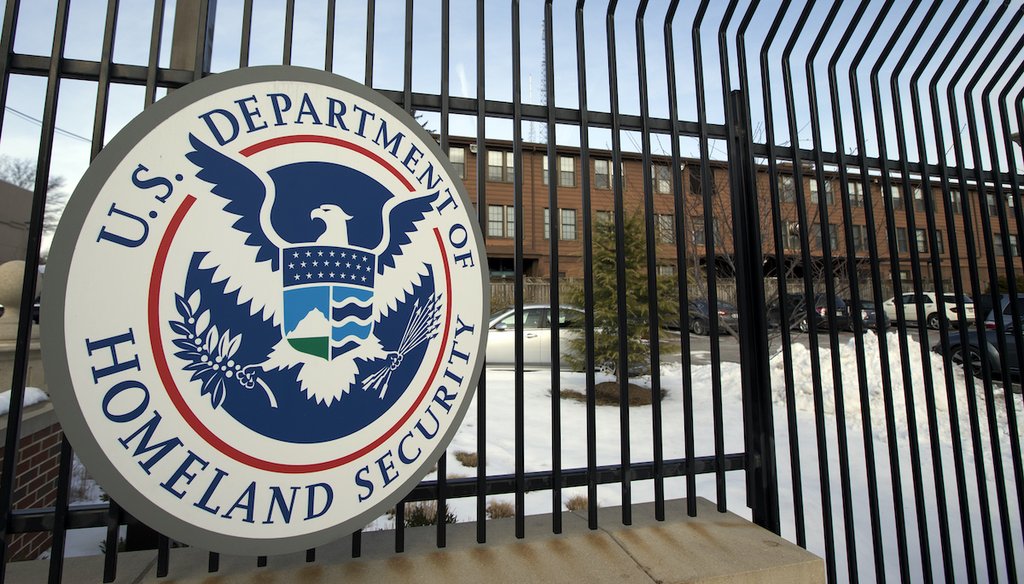



The Department of Homeland Security on Aug. 13, 2021, issued a bulletin that warned of a "current heightened threat environment across the United States." One popular social media post twisted its meaning into a false claim. (AP)
On Aug. 13, a bulletin from the National Terrorism Advisory System listed several conditions as evidence of a "heightened threat environment" with the potential to escalate into violence in the U.S. They included anger over COVID-19 restrictions, the 20th anniversary of 9/11, and online threats to government officials.
The advisory bulletin doesn’t label all Trump supporters or conspiracy theorists terrorists. Nor does the bulletin add any specific groups or individuals to existing lists of terror organizations.
The National Terrorism Advisory System doesn’t have the legal authority to designate new groups or individuals as terrorists.
Some social media users are claiming that the Department of Homeland Security has labeled them terrorists for opposing COVID-19 restrictions and believing that Donald Trump won the 2020 election.
"Behavior the White House and DHS deemed as terrorism today!" an image on Instagram. "Resisting COVID regulations, opposing government, spreading ‘misinformation,’ thinking the election was rigged."
"In other words if you are Trump supporter you are a terrorist!" reads the caption.
National security experts told PolitiFact that the claim is misleading.
"The conspiracy theory has no validity," said Jason Blazakis, former director of the Counterterrorism Finance and Designations Office at the State Department.
This claim appears to refer to a National Terrorism Advisory System bulletin released Aug. 13 by Alejandro Mayorkas, the secretary for homeland security.
The system was established in 2011 to replace a similar system created in the aftermath of the Sept. 11, 2001, terror attacks. The system releases two types of warnings to the American public: alerts and bulletins. Alerts, which are issued when DHS has "specific, credible" information about a terror threat, are the more serious and urgent of the two. Bulletins communicate "general trends" that could potentially escalate into threats of terrorism.
The Aug. 13 bulletin warned of a "current heightened threat environment across the United States," citing the 20th anniversary of 9/11 and other forces, including threats posed by "domestic terrorists, individuals and groups engaged in grievance-based violence, and those inspired or motivated by foreign terrorists and other malign foreign influences." It continued:
"These actors are increasingly exploiting online forums to influence and spread violent extremist narratives and promote violent activity. Such threats are also exacerbated by impacts of the ongoing global pandemic, including grievances over public health safety measures and perceived government restrictions."
It said that violent extremists who are "racially- or ethnically-motivated" or "anti-government/anti-authority" remain a national threat priority, and warned they "may seek to exploit the potential re-establishment of public health restrictions as a rationale to conduct attacks."
It also warned that "domestic violent extremists" have been introducing and amplifying online narratives that promote violence, including "continued, non-specific calls for violence on multiple online platforms" associated with such "ideologies or conspiracy theories on perceived election fraud and alleged reinstatement, and responses to anticipated restrictions relating to the increasing COVID cases."
Nowhere does the advisory bulletin label all Trump supporters or conspiracy theorists terrorists. Nor did the bulletin add specific groups or individuals to existing lists of terror organizations. And it does not say that "resisting COVID regulations" and "thinking the election was rigged" amounts to terrorism.
The bulletin "doesn’t designate any individuals or groups as domestic terror organizations," said Faiza Patel, director of the Brennan Center’s Liberty & National Security Program. "It is similar to statements by the director of national intelligence and the FBI that identify domestic terrorism as the principal threat facing the U.S. at this time and uses the same terminology."
The legal authority to officially designate groups as terrorists belongs to the U.S. departments of State and Treasury, not to the National Terrorism Advisory System. And that authority doesn’t allow for American citizens to be designated as terrorists unless they are linked to a designated terrorist group based overseas, said Blazakis.
"There is no legal mechanism that exists to designate individuals who may be connected to groups like the Proud Boys, Oath Keepers, Three Percenters and the like," he said.
An Instagram post claimed that DHS "deemed as terrorism" behavior that includes "resisting COVID regulations" and "thinking the election was rigged." In summary, the caption to the post read, "if you are a Trump supporter, you are a terrorist."
A National Terrorism Advisory System bulletin cited anger over COVID-19 restrictions and online threats to government officials as points of political tension that could escalate into violence.
The advisory bulletin doesn’t label all Trump supporters or conspiracy theorists terrorists. Nor does the bulletin add any specific groups or individuals to existing lists of terror organizations. And it does not equate disagreeing with COVID-19 regulations" or "thinking the election was rigged" with terrorism.
The National Terrorism Advisory System doesn’t have the legal authority to designate new groups or individuals as terrorists.
We rate this claim False.
Interview, Faiza Patel, director of the Brennan Center’s Liberty & National Security Program, Oct. 12, 2021
Interview, Jason Blazakis, former Director of the Counterterrorism Finance and Designations Office at the State Department, Oct. 11, 2021
Congressional Research Service, Legal Sidebar, Domestic Terrorism: Some considerations, Aug. 12, 2019
National Terrorism Advisory System, Bulletin, Aug. 13, 2021
State.gov, Foreign Terrorist Organizations
FBI.gov, Terrorism definitions
Congressional Research Service, In Focus, Foreign Terrorist Organization, Updated Jan. 15, 2019
Department of Homeland Security, FAQ
Lawfare, Back to Threat-Level Orange and the need to update the National Terrorism Advisory System, Dec. 6, 2016
In a world of wild talk and fake news, help us stand up for the facts.
